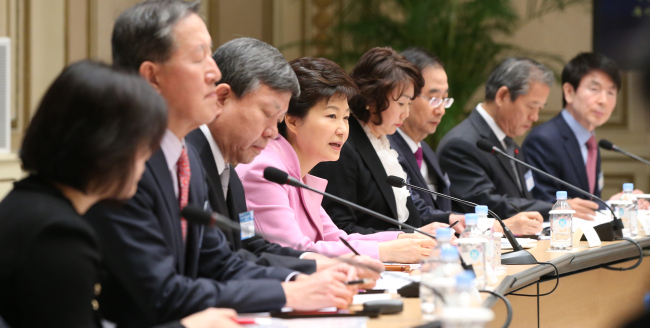 |
President Park Geun-hye (fourth from left) speaks at a meeting of government officials and businesspeople to promote trade and investment at the presidential office, Friday. (Yonhap News) |
The government said it plans to ease regulations and entry barriers on the medical and education industries as part of its additional measures to vitalize corporate investment.
After an investment promotion meeting at Cheong Wa Dae on Friday, Deputy Prime Minister and Finance Minister Hyun Oh-seok said the government would allow mergers and acquisitions among medical institutions, given the financial difficulties facing some hospitals.
“In a bid to offer better services to patients and upgrade the industry’s competitiveness, the government has decided to allow a (financially sound) medical corporation to take over an ailing hospital,” the Finance Ministry said in a statement.
In addition, any hospital will be entitled to own a subsidiary to pave the way for the launching of medical-related businesses such as medical tourism and purchases of medical equipment.
“The endorsement of hospitals’ ownership of subsidiaries is expected to attract more foreign capital and vitalize joint investments of hospitals and conglomerates,” said the ministry.
For domestic medical institutions seeking to open in the nation’s free economic zones, policymakers plan to amend the rule that limits the proportion of expatriate inpatients to 5 percent of the total sickbeds. The upper ceiling for sickbeds for foreigners would be raised to 12 percent.
Further, medical advertisements in foreign languages, such as English, Chinese and Japanese, will be allowed in airports, subways, major cities and tourist spots.
The government, however, has remained undecided over the proposal made by a group of economic advisers to ease regulations governing the entry of foreign hospitals into FEZs. They had called for the elimination of the requirement for foreign hospitals seeking to open in FEZs to have foreign doctors comprise at least 10 percent of their doctor staffs and to have a foreign chief.
For the education sector, joint venture schools will be allowed in places like the Jeju Special Self-Governing Province and eight FEZs, including Songdo in Incheon.
Until now, foreign schools have only been allowed to open and run international education facilities on their own and have been barred from paying dividends on accumulated surplus funds.
The government also plans to permit foreign schools to borrow privately held land to construct auxiliary facilities, such as physical training centers and auditoriums, and allow schools to set up English-language camps in cooperation with regional governments.
The ministry said it will submit law revisions to the National Assembly by the end of the first half of next year to allow the establishment of joint entities between foreign and local school operators.
Finance Ministry officials said every effort would be made to implement the changes and revise regulations in a timely manner so they can contribute to the ongoing economic recovery.
Presiding over the trade promotion meeting, President Park called for the National Assembly to pass the bill on foreign investment promotion as early as possible.
Citing recent indices signaling economic recovery, she said “the ordinary people will suffer more difficulties should (policymakers and lawmakers) fail to make the best of the opportunity.”
By Kim Yon-se (
kys@heraldcorp.com)








